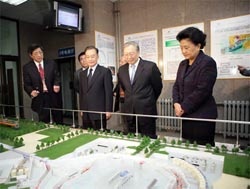Premier Wen Jiabao has hailed China's 20 years of effort in developing the Beijing Electron-Positron Collider (BEPC), and he urged the scientists involved to promote basic and emerging research and China's innovation capabilities.

The premier made the remarks on Tuesday during a visit to the upgraded project, known as BEPC II, at the Institute of High Energy Physics (IHEP) of the Chinese Academy of Sciences (CAS) in Beijing.
Wen was accompanied by Liu Yandong, a state councilor and member of the Political Bureau of the Communist Party of China (CPC) Central Committee.
The premier attended a workshop and exchanged views with some leading scientists, including Lu Yongxiang, the CAS president and vice chairman of the Standing Committee of the National People's Congress; Chen Hesheng, IHEP director; Xiang Libin, director of the CAS Opto-Electronics Research Institute; Li Zhensheng, an academician with the Institute of Genetics and Developmental Biology, and Ding Zhongli, a vice president of the CAS. Tsung-Dao Lee, a Chinese-American and 1957 Nobel laureate in Physics, also attended the workshop.
The BEPC project "has established China's international status in the sector of particle physics and generated the country's first group of scientists for large-scale research projects," said Wen, who is also a member of the Standing Committee of the CPC Central Committee Political Bureau.
The premier expressed his hope that the IHEP could be built into a world-class, multi-purpose and comprehensive state-level research base.
Wen highlighted the key role of science and technology in resolving major global challenges. Amid the global financial crisis, he said, it is of great importance "to promote a stable and relatively fast-growing economy, by relying on science and technological progress."
While at the IHEP, Wen met with U.S. delegates to the 29th meeting of the Sino-American Joint Commission on High Energy Physics.
The Chinese leader called the BEPC II a model project for Sino-American and multinational cooperation.
The BEPC is one of the world's eight largest high-energy accelerators. In 1988, the late leader Deng Xiaoping visited the domestically built facility, shortly after it achieved its first collisions between electrons and positrons.
The upgrade started in 2004 and cost more than 640 million yuan (about 93 million U.S. dollars), according to CAS sources.
Among other improvements, BEPC II has a more powerful injection accelerator that produces the high-energy electrons and positrons and an extensive use of super conducting technology. (Source: www.gov.cn)